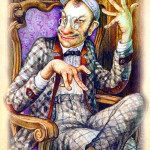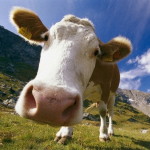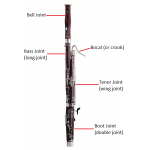To Translate, or to Transliterate? That is the Question: The Curious Case of the name, Fagot-Korovyov, in translating ‘Master and Margarita.’
Going further with my translation of Master and Margarita by Mikhail Bulgakov, I have hit on a puzzle regarding how best to put into English the names given to one particular character. In an earlier post I had discussed the varying levels of meanings attached to the names of characters in this novel, and decisions about whether to translate or transliterate. The case of this one figure is complicated in a number of ways: he is actually given, at different points in the story, two names, but single names and without any explanation as to how they relate to each other; and both of these names have clear connections with fairly common nouns in the Russian language. So what shall we call him? Korovyov? Cow? Fagot? Bassoon?
This fellow first appears in chapter one as an hallucination, floating in the air before Mikhail Alexandrovich Berlioz, editor of a literary journal. Soon after this he is encountered by the same Berlioz at the park at Patriarch’s Ponds, and is described as tall, thin, wearing a checkered jacket, a jockey’s cap, broken pince-nez and dirty socks.
He is subsequently referred to often as “the checkered one.” In chapter nine, when Nikanor Ivanovich Bosoy (whose last name, incidentally, is a Russian word meaning “barefoot”), chairman of the housing association for the apartment building in which Berlioz has an apartment, insists on knowing the checkered one’s surname, gets from him the vague response, “well, let’s say, Korovyov.” Now this name is solidly related to the Russian word for cow—корова, or “korova,” but I don’t see any reason why calling him “Cow” helps define his character. However, a website devoted to this work, masterandmargarita.eu, suggests that this name “reminds us of the Golden Calf with which Mephistoteles celebrates the omnipotence of money in the opera Faust of Charles Gounod (1818-1895).” This explanation also works with the events of chapter twelve, when Korovyov produces a rain of money, which sends the audience scrambling for it, in a Moscow theater as Voland’s assistant in their stage appearance there.
It is at the beginning of this performance that Korovyov is given another name, by Voland himself: Fagot. This is exactly the nominative form of the Russian word for bassoon, and it does fit, sort of, as his physical appearance and the descriptions of his changeable voice might be called bassoon-like. Compounding the decision as to whether to render this as “Fagot” or “Bassoon” is the fact that English language readers might easily read “Fagot” as the English word “Faggot,” which would imbue this name with a whole new set of associations. The confusion is not so great if the Russian word is pronounced properly, with the accent on the last syllable, but the average English speaker reading this translation would probably not know this, and default to the pronunciation of the word it reminds them of.
To this point I have decided to transliterate both of these names, rather than translate them. I do this mainly because it sounds better to read it his way. There is no confusion as to whether we are reading about the person in question, some bovine, or a wind instrument. With this, though, there lingers the sense that Bulgakov’s careful choice of names to help define his characters is lost. I think the best solution would be to mention the importance of the meanings of names in the introduction to a translation, and perhaps to include a glossary of characters with the meanings of the Russian words from which their names are derived.
© 2013, John Dougherty. All rights reserved




thank you for clearing this up for me as an english, non-russian speaking reader!